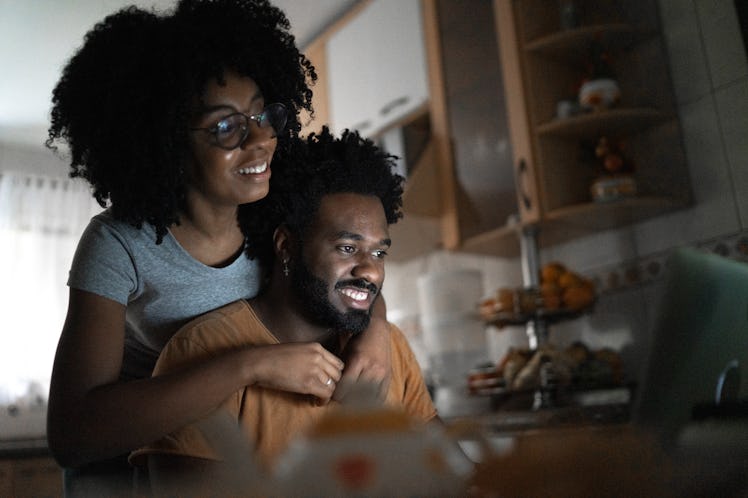
Here's How To Deal With Separation Anxiety After Quarantining With Your SO
Getting through COVID-19 has required tons of sacrifice and caused plenty of stress for people around the world. But for couples fortunate enough to be quarantining together, this period has provided at least one silver lining: getting to spend uninterrupted quality time together, potentially growing closer and strengthening their relationships. Now, as parts of the country have begun to open back up, some people may be experiencing a new and dismaying feeling: separation anxiety after quarantining with your partner. But what is separation anxiety, exactly, and how's it different than simply being lonely or missing your partner? "Separation anxiety is typically intense or even overwhelming anxiety about being away from your partner, whereas loneliness is more of a state of being," Nicole Richardson, licensed marriage and family therapist, tells Elite Daily.
While separation anxiety isn't common in adults under normal circumstances, the last few months have been anything but typical. “Prior to COVID and the recent social and political upheaval, there was a certain constancy and predictability of life. That's been turned upside down, and there's great uncertainty about life right now. Almost everyone's experiencing it to one degree or another,” Dr. Gary Brown, a prominent couples therapist in Los Angeles, tells Elite Daily. As such, it's unsurprising that some people who are now having to spend time away from the person who represents their idea of security may find this change difficult to bear, explains Richardson. "When things are heightened due to extreme stress, it is far more common to rely more heavily on primary attachment figures for support, comfort and a sense of well being," she says.
If this is resonating with you, but you’re still unsure if what you're feeling qualifies as separation anxiety, Dr. Brown says there are a few tell-tale signs that differentiate it from other kinds of loneliness or anxiety. “They include, but are not limited to, the following: fear of being alone, sadness, panic, constant thoughts and fears about where your partner is, and worrying that something might happen to your partner when they leave your home,” he says.
What You Can Do About Separation Anxiety.
Anxiety of all kinds can make you feel like you're powerless, but that's not the case. There are things you can do to help mitigate feelings of separation anxiety, as Anita Chlipala, licensed marriage and family therapist and author of First Comes Us: The Busy Couple's Guide to Lasting Love, tells Elite Daily. The first step, she says, is to speak up about what you're experiencing. “Tell your partner that you have anxiety when you're separated and be specific about what you need from them to help ease your anxiety,” says Chlipala. “For example, it’s reasonable to ask for more frequent contact while you’re apart, whether it’s more texting or video chats.”
It can also be helpful to self-soothe by reinforcing positive thoughts. Chlipala suggests repeating the following: “Wanting space is normal, especially after spending so much time together. My partner constantly calls or texts when they say they will. They're safe, nothing bad will happen because we're apart.” Another little trick that can help is to create a ritual around saying goodbye, says Chlipala. “Override the negativity with positive associations by creating a ritual that you look forward to and cherish," she advises. "You can have a kiss and share a long embrace with your partner telling you, ‘I’m here for you. I’ll be back. Can’t wait to see you when I return.’”
Richardson adds that meditation can also be a helpful tool in combating your fears about being away from your partner. “Mindfulness techniques are fantastic for self-soothing and reducing anxiety,” she explains. “Address the real source of your stress, if it is world events, local issues, your personal health. The separation anxiety is a symptom, not the underlying issue.”
But above all, be gentle with yourself and ask for help if you're struggling. "We're pack animals, and we heal better with the connection and support of others. It may be necessary to expand your comfort to others as well,” says Richardson. While having the support of your partner, friends, and family is wonderful, it doesn’t have to stop there. Contacting a professional via video chat may help you heal and get relief. “Seek therapy with a cognitive behavioral therapist (CBT), especially if separation anxiety is negatively impacting your relationship and your own quality of life,” says Chlipala. “Although your partner can help you with your anxiety, it’s important to also do the work on yourself so you can manage your anxiety better. A CBT will provide you with tools that can decrease the anxiety associated with separating from your partner.”
During uncertain or stressful life moments, it's important to remember that there's no shame in needing to take extra care of your mental well-being. “It’s completely understandable and normal to experience some separation anxiety. It only becomes a problem if we become paralyzed by fear as a result of it,” Dr. Brown explains. “The good news is that you can reach out to family, friends, and professionals who are specifically trained and experienced in helping people navigate anxiety and the stress that comes with it. In short, you shouldn't go through this alone.”
Experts:
Dr. Gary Brown, a prominent couples therapist in Los Angeles
Anita Chlipala, licensed marriage and family therapist and author of First Comes Us: The Busy Couple's Guide to Lasting Love
Nicole Richardson, licensed marriage and family therapist